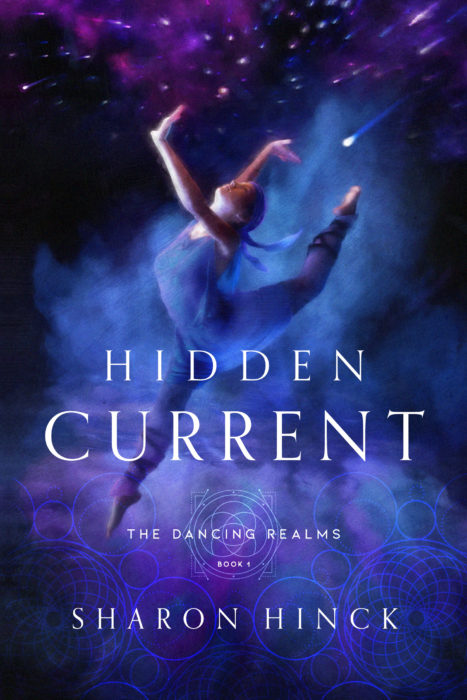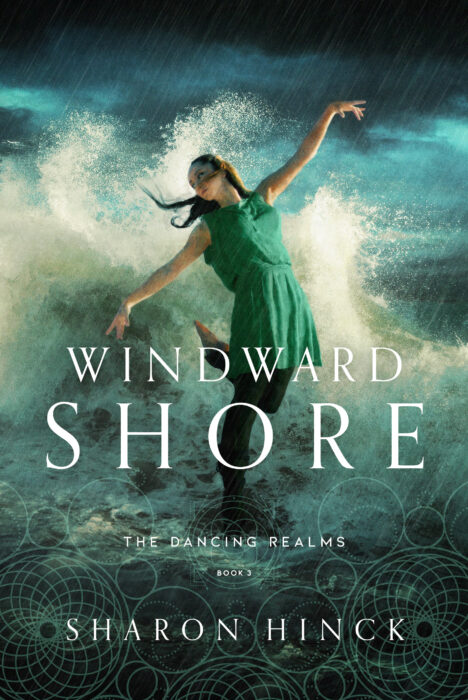66. What If You Escaped Your Floating Island, But Returned to Face Rebellion? | Windward Shore with Sharon Hinck
Podcast: Play in new window | Download (Duration: 1:11:01 — 66.4MB) | Embed
What if dancing could control your world, and your world was a floating island, and you had just escaped from a legalistic Order that had ruled the island? That may sound familiar, because we visited this world in one of our first episodes, about the novel Hidden Current. This time, author Sharon Hinck joins us to explore grace and true heroism versus legalism and false leadership in her recently concluded fantasy trilogy, The Dancing Realms series.
Introducing Sharon Hinck
Award-winning author Sharon Hinck writes “stories for the hero in all of us”—stories about ordinary women on extraordinary faith journeys. Known for their authenticity, emotional range, and spiritual depth, her novels include the groundbreaking The Sword of Lyric fantasy series and the imaginative new The Dancing Realms series, which began with the Christy Award–winning Hidden Current and was followed by Forsaken Island. Sharon’s writing has also been honored with three Carol Awards. For this latest series, she drew on her experience as a ballet teacher, dancer, and choreographer. Explore her series at The Dancing Realms group on Facebook.
Windward Shore, book 3 of The Dancing Realms series
The island world of Meriel faces an old adversary and a new danger. Will the reformed Order die before it has a chance to blossom?
Storm clouds loom on the horizon as Carya and Brantley struggle to overcome wounds of the past and build a future together. The fragile new Order is on shaky ground, with too few dancers and sparse resources. Then trouble erupts—and now an insidious rebellion and a new foe threaten their entire world.
When she uncovers an old enemy behind all the destruction, Carya realizes the past is not done with her. With conflict tearing apart the dancers and villages, rimmers are soon overrun, and Carya must unite her people by leading the battle to protect the very heart of her world … or lose it all.
 Exploring the Dancing Realms with Sharon Hinck
Exploring the Dancing Realms with Sharon Hinck
- In book 1, Hidden Current, Calara leaves the legalistic Order that trained her in magical dancing forms, but abuses this gift for control. How do you interpret these fantastical elements that often find parallels in the real world?
- In book 2, Forsaken Island, Calara, now known as Carya, and her friend Brantley leave their island for the first time. They’re soon lost in a world whose peoples use creative gifts but forget their own purposes. What ideas helped you create this sequel?
- Finally in book 3, Windward Shore, Carya and Brantley return to the island world of Meriel. But as we’ve heard, the island isn’t stable. Did you have this finale in mind all along? How do earlier themes bear fruit?
Fantastic fans
David C. wrote about episode 56:
Greetings! Still loving the podcast and what you guys are doing. I have a question that relates to your episode about strength and female characters that you did with Elisabeth Wheatley.
Recently, I got into a debate with some other Christians online regarding the meaning of Deut. 22:5 that prohibits a woman from wearing a man’s clothing, and vice versa. The claim was, based on hermeneutics and the meanings of words in the original language, that women are not permitted to be in combat and that it is, to paraphrase one podcaster, an abomination to the Lord for a woman to carry a sword.
No doubt, this irks me, because many of our favorite stories include women who employ swords or other instruments of combat: Wonder Woman, Princess Leia, Eowyn, Mulan, etc. And despite the examples of Deborah and Jael in the Bible, there are arguments that stand that these women don’t support a view of women in combat.
So my main question: Can Christian fans enjoy films and books with warrior women, and can Christian writers create positive, strong, Christ-like female main characters who pick up a sword to do battle (not just self-defense), in a fantasy or a fictionalized version of our world (i.e. Hermione Granger, Black Widow)? Or are these other Christians correct, and creating such characters are abominations to the Lord?
Next on Fantastical Truth
“Fiction shouldn’t preach!” many critics say. They may even preach about it. But even if excellent Christian-made stories should not preach, does this mean the stories will have no teaching at all? Is preaching the only way we learn, or don’t we also learn through discipleship. This includes but isn’t limited to sermons! With help from Lorehaven writer and That Pale Host author L. G. McCary, we’ll explore how great Christian-made stories do have a purpose: not to preach beyond the fourth wall, but to help disciple our imaginations in Christ.






























Share your thoughts about this podcast episode